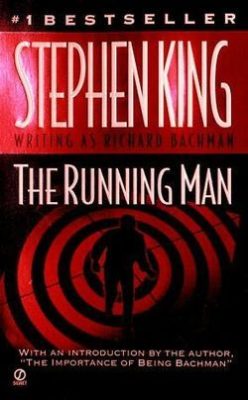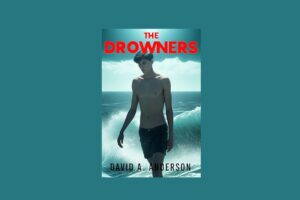
The Running Man by Richard Bachman
The Running Man is a dystopian novel by Richard Bachman, aka Stephen King, set in 2025. The story follows Ben Richards, a jobless man with a very ill daughter in desperate need of money. His wife has been prostituting herself to get together what she can, but he wants to end their poverty once and for all. He decides to put himself forward for the Running Man, a reality TV game show in which contestants have to avoid capture (and death) as hitmen chase them around the city. With each hour the contestant remains free they accumulate $100, with an additional $100 for each hitman they themselves manage to kill. If they survive a full thirty days they are awarded $1 billion.
As with the majority of Stephen King novels I’ve read, The Running Man has a brilliant premise – but a disappointingly poor delivery. Richards is an incredibly unsympathetic character and, rather than willing him to survive the full thirty days, I often found myself not caring if he died. The addition of his gravely ill daughter failed to stir any form of pity within me as she was clearly nothing more than a half-hearted plot device used to flesh the main character out and give him purpose.
I suppose the biggest problem I had with the novel was its flagrant racism. I believe King attempted to use racism in the same way Tarantino utilises it in most of his movies, i.e. using the ‘n’ word so frequently it makes the white characters seem pathetic, silly and weak-minded, but The Running Man was quite spiteful in comparison. I often flinched when black characters were mentioned, their presence just another forced plot device. This bigotry was never addressed or clarified in any way, it just seems as though equal rights goes out the window in the near future. [I just want to add I don’t believe King is a racist, I just think his use of it in The Running Man was clumsy and poorly judged.]
King is a great writer and is borderline genius when it comes to his incredible, awe-inspiring ideas, but I find it bizarre when authors present the characters of a dreary, dystopian future as cold and loveless. Even in the harshest war-torn countries there is warmth, compassion and empathy – perhaps even more so than in some ‘safe’ first-world countries.
The Running Man taught me that a great plot idea may be an essential element to every novel, but if the reader doesn’t care about the characters it becomes immediately ineffective. Reading is always a human experience, despite being a solitary activity.
This review is part of my 2017 Reading Challenge.



Leave a Reply